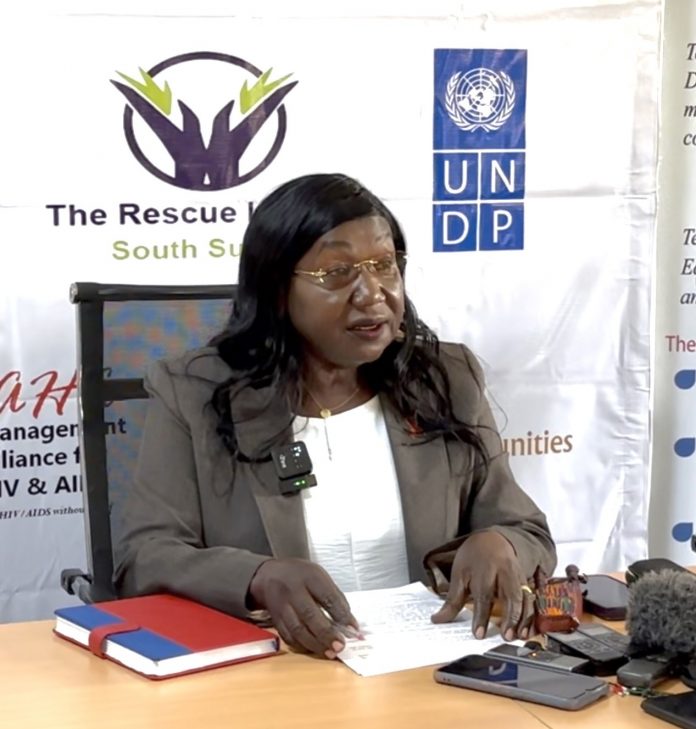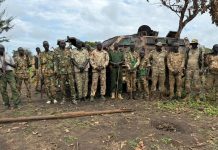By Sebit Patrick
The South Sudan HIV/AIDS Commission has warned that medical supplies for HIV patients may run out within two years, following funding cuts linked to Donald Trump’s aid freeze. The country’s weak health system continues to struggle without sustained support.
With a 2.5% HIV prevalence rate, over 70,000 patients are on treatment, while nearly 200,000 remain unreached. Among those affected is 30-year-old Margret Jokudu, an HIV-positive mentor mother working at Juba Teaching Hospital.
“The aid freeze affected us, even me, and all over the world it affects people, especially us who are living with HIV. We’re crying all about ARVs, because without ARVS, you wouldn’t be hearing my voice. And because of the ARV, we are giving birth to healthy children.” Said Jokudu
She said that thanks to the medication, she has lived a healthy life for years and given birth to HIV-free children despite her status. Jokudu fears that without continued access to lifesaving ARVs, a supply shortage could cost her life.
“For us, now we are not sleeping. How can we sleep without ARVs? It’s very, very hard. Even some of us, the viral load has already jumped up because of the stress, because you can not sleep with a lot of thinking, and once you have HIV, you don’t want to stress yourself. You need to eat, you need to be free of mind, but now we are not free; we are really affected by this stopping of the funding.” Jokudu stated
Abala Victor, a veteran soldier also living with the virus, said that if the supply of the consignment runs down, they might die. Abala called on the government to come to their rescue.
“It’s going to affect us because I can not manage to reach the hospital because there is no money, maybe even if the drug stops at the hospital, which means all of us who are positive, we are going to die.”
“Our message to the government is that we are crying for the government to look after us who are positive. Let them put their eyes on us since the funding has now stopped, we are just crying for the government to sit down, not only for us, but also for all of South Sudan; we are going to suffer. Majorly, for us, positive, is going to affect us a lot, so I’m crying for the government to at least look after us.” said Abala
Angelina Doki, a single mother who lost her husband to the virus nearly 20 years ago is concerned about the majority who are not yet enrolled. She stressed that those in the rural areas might be on the brink of suffering the consequences more severely.
“It has affected us really, nowadays we don’t sleep, especially with the drug. It has affected us and it has affected those who have not yet been enrolled, and it has affected us because the drug is not going to reach those who are still in rural areas. Leave us in Juba town. There are some rural areas in the states that this thing is going to affect even more. It affected us here, and it is now going to affect them there.” Angelina said.
Professor Dr. Peter Adwok, a lecturer at the University of Upper Nile’s School of Medicine and a Member of South Sudan’s Revitalized Transitional National Legislative Assembly, emphasized the vital role USAID has played in supporting vulnerable communities.
He warned that the loss of this support could lead to despair, depression, and even premature death among people living with HIV and tuberculosis. Adwok urged the government to step in and address the gaps left by the withdrawal of U.S. aid.
“It is a sad story, really, that this program started long ago and was actually boosting the conditions of poor people around the globe, and now that Trump came with this order, it is going to be very depressing to the government, to patients, to co-patients, and so forth.” said Adwok.
“Now the direct impact on people living with HIV is immense; if they know that there is nothing for which to hope, they can be depressed, and death can come prematurely, and also the people of tuberculosis are affected. Therefore, it is up to the government of this country to try to fill the gaps left by the Trump decision.” he urged.
In response to public concern, the national HIV/AIDS Commission has assured citizens that medical supplies for people living with HIV are currently sufficient and will last for the next two years.
Dr. Esterina Novelo stated that despite Trump’s aid freeze, there has been no major disruption, with HIV medications still available. She also confirmed that healthcare workers have resumed duties at their assigned facilities.
“We have the drugs available; the doctors are there; the nurses are there. All the services are provided on a daily basis. They should access. They should not shy away from going to the hospital because some of them are still having that phobia when they went and found the hospital was closed. If the clinic is closed, it means it’s not functioning. We have opened them and they are functioning fully, and they should access their treatment without any interruption. Those who need drug refills should go for the drugs.” Esterina revealed.
“The only thing up to now is that the government is still taking community interventions as a priority, whereby we have community-led monitoring staff who are doing voluntary work to refill the drugs for those who are unable to come to the hospital. And also providing care to those who cannot do it by themselves because they are very sick and at home.” sha adds
In February, a local network of people living with HIV in South Sudan raised alarm over the potential impact of funding cuts, warning they could lead to premature deaths.” Mama Eveline
Letiyo Boki, Executive Director of the National Empowerment of Positive Women United, said they had long relied on support from USAID.
She explained that the funding had enabled them to provide crucial educational, emotional, and psychosocial support to children living with HIV. Since the cuts, these services have stopped, putting the mental well-being of affected children at risk.
Letiyo reported that nearly 1,500 individuals have missed medical appointments and experienced treatment interruptions. If this continues, she warned, viral loads could rise, increasing the risk of AIDS and early death.”
“With support from USAID, we were providing essential support for children living with and affected by HIV. This support includes nutritional support, educational support, and psychosocial support, which is key to their well-being. As I deliberate now, most of these children living with and affected by HIV are not going to school. They lack emotional support, which may result in mental catastrophe. Within this short time of the stop work order, nearly 1500 people living with HIV who were on treatment have missed appointments, they have missed drugs, and they have been interrupted in treatment. We believe this is a call to our government and an eye opener not to depend on only foreign aid.” Said Letiyo
The Director called on the government to stop depending on foreign aid for the safety of its citizens and take immediate action to fill the gap left by foreign aid, and inject more domestic funds to strengthen the fight against the HIV epidemic.
“We therefore urge our government to take immediate action in filling the gap left by the freeze on foreign aid. Inject more domestic funds to strengthen the fight against the HIV epidemic. Take full control of the lives of the citizens of South Sudan. Improve health centres providing full treatment packages to its citizens who are the taxpayers, improve citizens’ living conditions, lastly improve all road networks to the states and grassroots levels to facilitate easy movements of medicines and food items.” She added
The government’s response came nearly a month after people living with HIV voiced fears over the suspension of a long-standing support program following Trump’s aid freeze. While the HIV/AIDS Commission confirmed that current drug supplies can last up to two years, uncertainty remains about the future.
In 2024, Parliament approved a SSP 4.1 trillion budget for the 2024–2025 fiscal year, allocating just 1.7% to the health sector, down sharply from 9% in 2023, raising further concerns about the country’s commitment to healthcare.
This story is reported with a grant from Journalists for Human Rights under the ‘Tackling Mis/Disinformation Project,’ funded by the Peace and Stabilization Program of the Government of Canada.





